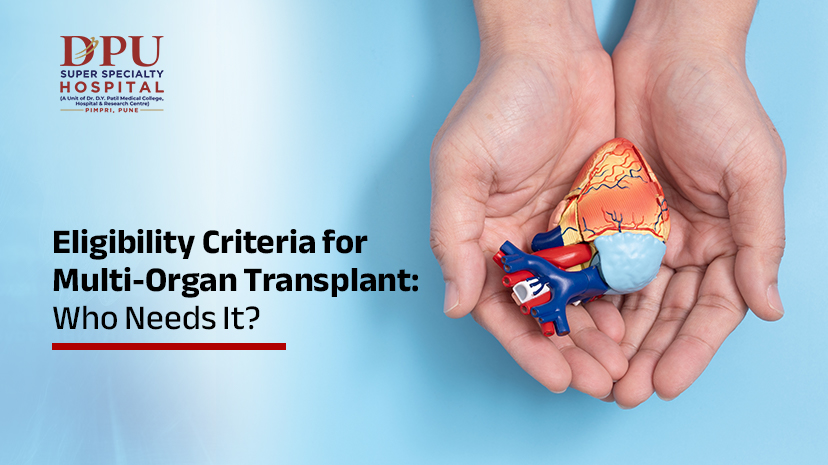Eligibility Criteria for Multi-Organ Transplant: Who Needs It?

Multi-organ transplants are complex and lifesaving approaches that involve the replacement of two or more organs in a single operation. These transplants are typically required for patients whose organs have failed due to certain conditions. The decision to undergo a multi-organ transplant is not made lightly, as it requires a complete review of various factors, including physical and mental health. In this blog, we will examine the conditions that often lead to multi-organ failure, the process for determining eligibility, and what patients need to know when thinking about this type of transplant.
1. Conditions That Lead to Multi-Organ Failure
Multi-organ failure occurs when two or more vital organs begin to fail, and a transplant is often the only solution. Several medical conditions can cause this kind of failure, and they vary in impact. Below are some common conditions that often lead to multi-organ transplants:
- Liver and Kidney Disease: Chronic liver disease, such as cirrhosis or hepatitis, can lead to liver failure, while kidney disease, particularly in the case of end-stage renal failure, can require a kidney transplant. When both organs fail, a combined liver-kidney transplant may be necessary.
- Heart-Liver Conditions: Certain heart conditions, such as end-stage heart failure, can lead to organ failure in both the heart and liver. For instance, patients with cardiomyopathy may require a heart-liver transplant if both organs are severely damaged.
- Cystic Fibrosis: Cystic fibrosis is a genetic condition that primarily affects the lungs but can also lead to damage to other organs, including the liver and pancreas. In severe cases, a multi-organ transplant involving the lungs, liver, and/or pancreas may be needed.
- Pancreas and Kidney Failure: In cases of Type 1 diabetes, patients may develop kidney failure over time. For those with severe kidney and pancreatic failure, a combined pancreas-kidney transplant can offer a chance for improved health and quality of life.
- Autoimmune Diseases: Autoimmune diseases, such as lupus or scleroderma, can lead to damage in multiple organs, including the heart, kidneys, lungs, and liver. In some cases, patients may require transplants of multiple organs due to the combined failure.
2. Assessing Eligibility for a Multi-Organ Transplant
The decision to undergo a multi-organ transplant requires a detailed and comprehensive evaluation process. Doctors will assess the patient’s medical history, overall health, and the specific organs involved in failure. Key factors considered during this assessment include:
- Age: While age is not always a determining factor, it can play a role in eligibility. In general, patients who are too young or elderly may face additional challenges during the transplant process. Older patients may have a higher risk of complications, while younger patients may require long-term immunosuppressive therapy.
- Overall Health: The patient's general physical condition is crucial for determining their ability to withstand surgery and recovery. This includes evaluating heart function, lung health, and the state of other organs. A patient with severe comorbidities or frailty may not be a suitable candidate for multi-organ transplant.
- Mental Readiness: Mental health plays an important role in transplant eligibility. Candidates must demonstrate the psychological readiness to undergo the rigors of surgery and the long recovery process. Support from mental health professionals may be necessary to assess emotional and psychological stability.
- Organ-Specific Factors: The extent of damage to the organs in question will also be a key factor. Doctors will assess whether the organs can be restored through transplant and if a combined transplant is feasible. For instance, if one organ is only partially damaged, it may be possible to wait for a single organ transplant instead of a multi-organ transplant.
- Potential Complications: The risks associated with the transplant, including the possibility of rejection or complications from immunosuppressive medications, must be weighed carefully. Doctors will assess the potential complications based on the patient’s medical history, the complexity of the transplant, and the patient’s ability to adhere to post-transplant care.
3. The Transplant Evaluation Process
Once a patient is identified as a candidate for a multi-organ transplant, a multidisciplinary team of doctors including transplant surgeons, cardiologists, pulmonologists, nephrologists, and other specialists will conduct a thorough evaluation. This process may include:
- Blood Tests: To evaluate organ performance and determine compatibility with potential organ donors.
- Imaging Studies: These may include ultrasounds, CT scans, or MRIs to evaluate the extent of damage to the affected organs.
- Psychological Evaluation: A mental health professional will assess the patient’s psychological readiness for the surgery and post-surgical recovery.
- Other Diagnostic Tests: Based on the organs engaged, the patient may undergo additional tests to assess their suitability for the transplant.
4. How Patients Can Prepare for the Multi-Organ Transplant Journey
Reaching the point of a multi-organ transplant is a long and tough journey. Patients should be prepared for several stages, from the initial consultation to post-transplant treatment. Here are some steps patients can take to improve their chances of a successful transplant:
- Follow Medical Advice: Patients should adhere to their doctor’s instructions regarding medication, lifestyle changes, and other treatments leading up to the transplant.
- Stay Physically Active: Maintaining physical strength and fitness can help patients prepare for surgery and improve recovery time.
- Build a Support System: Transplant patients require emotional and physical support from family, friends, and healthcare professionals. It’s important to have a strong support system in place before undergoing the transplant process.
- Mental Health Support: Counseling or therapy may be beneficial for helping patients cope with the stress and anxiety associated with transplant surgery.
- Educational Preparation: Patients should learn about the transplant process, including the surgery, recovery, medications, and lifestyle changes that will be required after the procedure.
Conclusion
Multi-organ transplants are essential procedures that save lives for patients with severe organ failure due to conditions like liver and kidney disease, heart-liver failure, cystic fibrosis, and more. The process of choosing a multi-organ transplant requires a comprehensive evaluation of physical and emotional health, as well as the overall readiness of the patient for surgery and recovery. By knowing the eligibility requirements and preparing for the steps involved, patients and their families can make informed decisions and improve their chances of a successful transplant. It’s important to consult with experienced transplant specialists to determine the most effective plan and ensure the best possible results.








